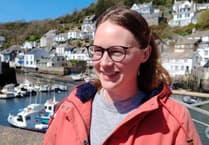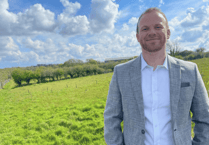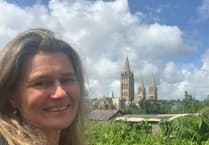“You’ll get square eyes”.
I was often told that as a child because I watched too much television. I have to admit I am still a television addict; it’s how I ended up working in broadcasting.
We didn’t have a lot of money when I was growing up. My dad had died at a very young age and consequently finances were very tight. But thanks to my dad, we did have a decent TV.
He’d bought a top-of-the range model not long before he died and it lasted us many years. It was a beautiful set, one of the earliest colour televisions from a famous Danish company.
It was housed in a wooden cabinet with a sliding door to cover the screen when it wasn’t in use. It was a work of art!
But I blame that television for my addiction. As a young lad growing up in Cornwall in a family with very little money, that TV was my window on the world.
From ‘Blue Peter’ to ‘Animal Magic’ and ‘Swap Shop’ to ‘John Craven’s Newsround’ I learned so much about what was going on in the big wide world beyond Truro.
Not only did I love the programmes, but I also became utterly fascinated with how they were made. How did all these stunning colour pictures end up on a screen in front of me in Cornwall?
It sparked a lifelong interest in broadcasting.
Although I ultimately ended up in front of the camera, my former colleagues at ‘Spotlight’ will tell you that I was equally interested in the technology behind the scenes.
I was incredibly lucky to turn a childhood obsession into a career and in a strange twist of fate I even got to interview one of my childhood TV heroes.
After the Foot and Mouth crisis in the early 2000s, we broadcast a special Christmas edition of ‘Spotlight’ from Hatherleigh and one of the guests was local resident, Noel Edmonds. Yes, Noel Edmonds of ‘Swap Shop’ fame.
Here I was on a freezing night in Hatherleigh telling Noel that he inspired me to get into broadcasting and here he was telling me he regularly watched me on TV. It was a surreal moment.
But as we spoke I don’t think either of us knew just how much television viewing would change.
From my childhood through to the moment I interviewed Noel Edmonds, TV had already dramatically changed from just three terrestrial channels to dozens of satellite services.
Since then of course the change has been even greater. Streaming services have completely changed our viewing habits.
I can remember having a conversation with a BBC colleague many years ago in the early days of the iPlayer. There was already talk that it would be the death of linear television.
There were predictions that we would no longer have television channels with scheduled programmes and that we would all be consuming what we want when we want it.
My colleague dismissed it as nonsense and said viewers will always want to have a schedule of programmes put in front of them. Back then I tended to agree with him.
But recently I have realised that very prediction has come true in the way I watch TV.
One evening it suddenly dawned on that I hardly ever watch programmes when the broadcasters schedule them.
Using streaming and catch up services, I now create my own television schedule. It’s like the old Woolworths pick ‘n’ mix. I can choose a selection of whatever I fancy.
It can be a whole evening of drama, or all comedy, or a bit of both. I can watch back-to-back episodes of an entire series in one go, as I recently did with the brilliantly funny Australian series ‘Colin from Accounts’.
Slowly but surely and almost without me noticing, I have stopped watching traditional linear television. I still spend too long consuming programmes, but I am no longer a slave to the schedule.
There are a few live events that really are best to watch as they happen. Sport for instance and competitive programmes such as ‘Strictly’, although that is one of the few programmes that I am not interested in.
Otherwise, I feed my television addiction based simply on what mood I am in rather than organising life around the listings in ‘Radio Times’. Other listings magazines are available (as they used to say on TV) but I wonder for how long?
The end of scheduled television can’t be too far way. How long can a financially stretched BBC afford to run terrestrial TV channels when everything is on iPlayer? Increasingly all the episodes of a new series are on iPlayer before they are on BBC One.
That tells me everything I need to know about the future direction of television. Internally the BBC’s new mantra is “Digital First”. Streaming content online is the number one priority.
I am not sure where this leaves those without broadband or those who struggle with technology. I suspect the TV channels will have to stay for a few more years until there is certainty that everyone can access content online.
But the switch off must be getting closer. I have already witnessed one historic switch off. Several years ago I was given special access inside the TV transmitter at Beacon Hill in Devon to report on the switch off of the old analogue signal.
The downside is that television is no longer the collective experience it used to be. Gone are the days when everyone at work or in the school playground is talking about last night’s big TV programme.
But I am quite happy with the way I now get my fix of TV; for an addict like me the endless choice and freedom from the schedule is bliss.
As for the square eyes, it didn’t happen. Although I am not sure what all that viewing has done to my eyesight.
What’s the modern equivalent? “Be careful, you’ll end up with phone shaped eyes”.
Now, what shall I watch tonight?
Bye for now.





Comments
This article has no comments yet. Be the first to leave a comment.